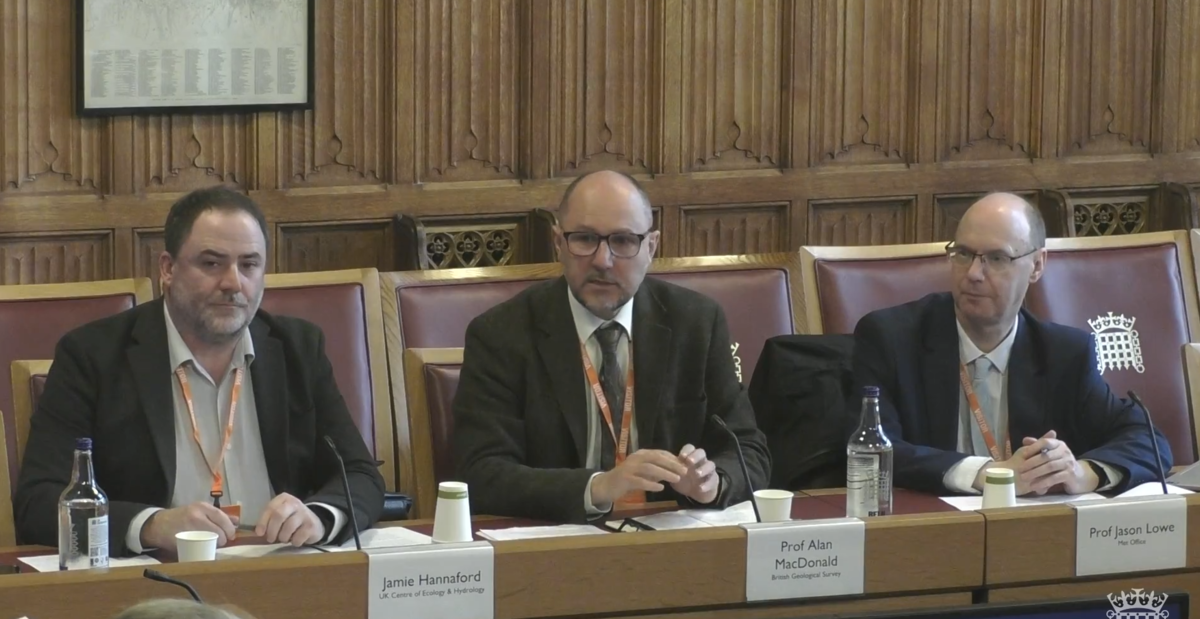CANARI at EGU General Assembly 2025
CANARI researchers will be taking part in the European Geosciences Union General Assembly 2025 (EGU25) from April 27th-May 2nd at the Austria Center, Vienna. This year, we have a wide range of talks and posters where our researchers will present on topics from water resources and modelling sea ice variability to ocean currents and rapid Arctic change. Listed below are some of the CANARI-related sessions over the week. You can follow along with conference proceedings on @canari-science.bsky.social and #EGU25.
Monday 28th April
PICO presentations
The UKCEH Flood Event Data Suite (co-authors include Amulya Chevuturi – UKCEH)
- The UKCEH Flood Event Data Suite consists of a procedure to identify paired rainfall-runoff events from paired time-series to identify drivers of flood events.
Poster presentations
Linking regional extreme sea level variability in North-Western Europe to large scale climate modes (co-authors include Marilena Oltmanns – NOC)
- Extreme sea level (ESL) events pose the highest risk to coastal communities and infrastructure. We used EOF analysis and clustering extreme sea level variation on regional scale to understand patterns in larger Atlantic weather variables
Tuesday 29th April
Oral presentations
Iona Colfescu (NCAS): Explainable neural nets for disentangling sources of predictability in the North Atlantic Sea Surface Temperature (NASST)
- The relative contributions of atmospheric versus oceanic influences on the long term North Atlantic sea surface temperatures remain ambiguous. We utilize neural networks (NNs) to assess the significance of atmospheric and oceanic predictors in forecasting the state of NA-SST within the CANARI Large Ensemble.
Wednesday 30th April
Oral presentations
Rachael Armitage (UKCEH): Characterising historical and future transitions in UK hydrological extremes
- Hydrological transitions between extreme wet and extreme dry events are identified in both historical and future river flow and precipitation projections over the UK, to characterise the spatial distribution and assess future changes in the characteristics of transitions.
Laura Baker (NCAS): Intermittency of seasonal forecast skill for the wintertime North Atlantic Oscillation and East Atlantic Pattern
- The year-to-year contributions to multi-model seasonal forecast skill are assessed for the wintertime NAO and EA. Years with high NAO predictability are associated with substantial tropical forcing, generally from the El Niño Southern Oscillation (ENSO). Well-forecast EA winters also generally occurred when there was substantial tropical forcing.
Poster presentations
Stefanie Rynders (NOC): First look at Arctic eddies in a kilometric NEMO5 simulation
- Statistics and validation of eddy statistics in a kilometric Arctic Ocean NEMO-SI3 model. We aim to validate the number of eddies as well as eddy sizes with available data from satellite and moorings.
Xiaoyan Wei (NOC): Arctic spin-up under melting sea ice
- The role of the Arctic spin-up in facilitating heat transfer from deep warm Atlantic Water to the cold, fresh Arctic Ocean surface and accelerating sea ice melt.
Reinhard Schiemann (NCAS): The CANARI HadGEM3 Large Ensemble: Design and evaluation of historical simulations
- The HadGEM3 Large Ensemble was recently completed within the UK NERC multi-centre CANARI project. In this poster, we document the ensemble design and evaluate key aspects of historical ensemble performance against observational data. Furthermore, analogues of the extremely hot North Atlantic sea surface temperature anomalies in the summer of 2023 can be found in the CANARI Large Ensemble, whereas there are no close analogues in the historical record.
Kate Oglethorpe (BAS): A Dataset of Arctic Ocean Water Masses from 40 Years of Hydrographic Observations
- We investigate the spatial and temporal distributions of Arctic Ocean water masses since 1980 by estimating relative fractions of water masses Arctic-wide CTD data using an inverse modelling method.
Thursday 1st May
Oral presentations
Hadush Meresa (UKCEH): Identifying the drivers of flood generation mechanisms and their seasonal variabilities
- Examining flood generation mechanisms across 600+ UK catchments by quantifying the relative contribution of variables susch as excess soil moisture, snowmelt and extreme rainfall.
Poster presentations
Pitfalls and recommendations for event detection of drought to flood transitions (co-authors include Rachael Armitage- UKCEH and Eugene Magee – UKCEH)
- Streamflow droughts and floods are typically studied independently. Rapid transitions from drought to flood have the potential to be highly destructive. We assess the sensitivity of transitions detection to different methodological choices, and evaluate their appropriateness using eight global case study catchments.
Friday 2nd May
Oral presentations
Amulya Chevuturi (UKCEH): Novel and skilful ocean-based predictors for European hydro-meteorological extremes
- Novel North Atlantic Sea surface temperature (SST) indicators are linked to meteorological and hydrological extremes across European catchments at long lead times.
Wilson Chan (UKCEH): River flow amplification under climate change: attribution and climate-driven storylines of the winter 2023/24 UK floods
- The winter half-year 2023/24 UK floods is used as a case study to demonstrate a framework for post-event analysis of hydrological extremes, including rapid event attribution, “what-if” UNSEEN storylines and the use of large ensembles to appraise trend detectability over the 21st century.
Poster presentations
David Schroeder (CPOM): Barents Sea ice volume budget in a 40-member historical ensemble of a global climate model
- Analysis based on the CANARI large ensemble shows that sea ice gain is Arctic-wide dominated by sea ice growth with a net contribution from sea ice advection and divergence generally below 10%. However, in the Barents Sea this contribution reaches 100% with significant ice growth only taking place on the northern edge of the Barents Sea.


